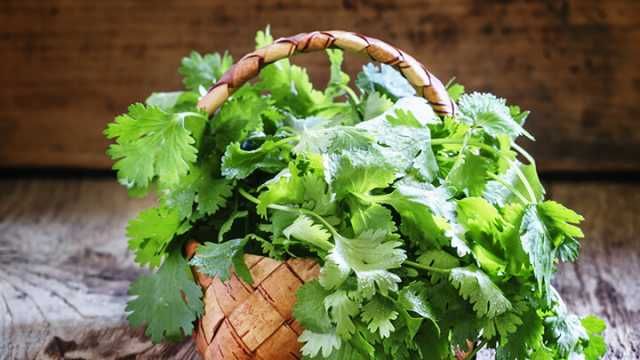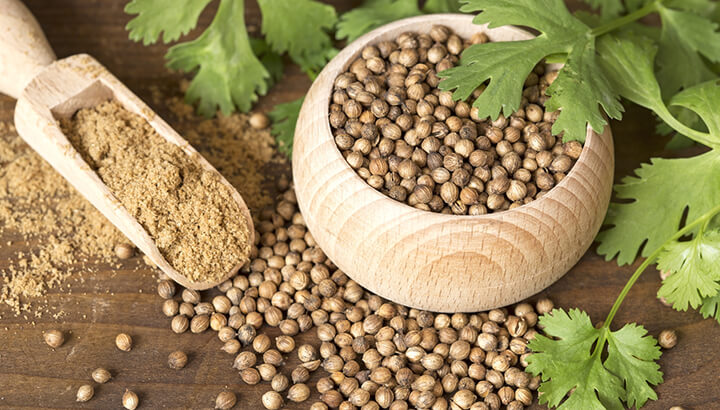
Whether you know it as coriander or cilantro, this tasty versatile herb is used in many culinary dishes. Dig a little deeper and you’ll soon discover health benefits surrounding both the leafy greens and seeds. Coriander is often discarded as a simple garnish, but it’s actually packed with vitamins, minerals and several beneficial properties.
What is coriander?
Coriander, commonly known as cilantro, is an herb used around the world as a condiment or garnish for culinary dishes. One of the reasons that cilantro is so unique is due to its versatility. The leafy greens of this plant add a fresh, citrusy flavor to dishes while incorporating several health benefits.
Once the plant flowers, it produces coriander seeds. Coriander seeds contain their own health benefits as well. When dried, these seeds are used as a spice. They are available whole or in ground powder form.
Is it coriander or cilantro?
What’s in a name? Well, it depends on where you live. Here in the U.S. the leaves and stalks of the plant are called cilantro, and the seeds are called coriander. But if you live in Britain, you would refer to the leaves and stalks of the plant as coriander. And the seeds are called coriander seeds. In some parts of the world, the word cilantro doesn’t exist.
Health benefits of coriander
Coriander resembles flat leaf parsley. It’s rich in phytonutrients, flavonoids and phenolic compounds. It’s a good source of dietary fiber, calcium, iron, potassium, magnesium and vitamins A, C, E, K. One-quarter of a cup of fresh cilantro gives you 270 IU of vitamin A. It also provides 16 percent of your daily recommended value of vitamin K, which helps build strong bones, teeth and hair.
Health benefits of coriander seed

Coriander seeds have a healthy reputation of their own as being a healing spice. In fact, in parts of Europe, coriander is referred to as an “antidiabetic” plant. In parts of India, it is used for its anti-inflammatory properties. And in the U.S., it is being studied for its cholesterol-lowering effects. These seeds are an excellent source of minerals like iron, copper, calcium, potassium, manganese, zinc and magnesium. They are also a good source of vitamin C, with 100 grams of dry seeds providing 21 milligrams (or 35 percent) of your recommended dietary allowance (RDA).
Lowers cholesterol levels
Linoleic acid, oleic acid, palmitic acid, stearic acid and ascorbic acid present in coriander effectively reduce cholesterol levels in the blood. They may also reduce the bad cholesterol lining the inner walls of the arteries and veins, leading to cardiovascular disease. But more importantly, coriander may help raise the healthy cholesterol levels, which works as a preventative for cardiovascular disease. Research published in the Journal of Environmental Biology studied the cholesterol-lowering property of coriander seeds. Rats fed coriander seeds in their diet had a significant decrease in cholesterol and triglycerides.
Staves off diarrhea

Essential oils found in coriander, such as borneol and linalool, help aid in digestion and help reduce diarrhea. A Southern Illinois University study found that coriander may also cure diarrhea caused by microbial and fungal infections. Coriander is also helpful as a way of preventing nausea, vomiting and other stomach disorders. In addition to its medicinal benefits for the stomach, fresh coriander leaves are an excellent way to get your bowels prepared for a large meal.
Aids digestion
Because of coriander’s rich aromatic essential oils, it aids secretion of enzymes and digestive juices in the stomach. It’s also helpful in treating eating disorders like anorexia. A study in the Avicenna Journal of Phytomedicine found that coriander may be a suitable, natural alternative medicine for anorexia.
Helps reduce blood pressure
A study in the Journal of Ethnopharmacology shows that coriander positively reduces blood pressure in patients suffering from hypertension. The interaction of calcium ions and cholinergic, a neurotransmitter in the peripheral and central nervous system, relaxes blood vessel tension. It thereby reduces the chances of experiencing cardiovascular conditions, including heart attacks and strokes.
Prevents mouth ulcers
The chloroform extracts of coriander are antiseptic for the mouth, according to a study in the Journal of Bioscience. Other components also have antimicrobial and healing effects that help ulcers in the mouth from becoming worse. In addition, they help speed up the healing and freshen the breath. Coriander is often used as an antiseptic component of all-natural toothpaste. In fact, even before the invention of toothpaste, people would chew on coriander seeds to eliminate bad breath.
Helps prevent anemia
Coriander is high in iron, which directly helps those who suffer from anemia. Low iron can result in shortness of breath, heart palpitations, extreme fatigue and brain fog. Iron helps the organ systems, increases energy and strength, and promotes healthy bones.
Helps manage seasonal allergies
Multiple studies have shown coriander to have strong anti-histamine properties. That means reducing the uncomfortable effects of seasonal allergies, including hay fever. Coriander oil is also effective for reducing allergic reactions to plants, insects and food, externally and internally. Internally, coriander can ward off anaphylaxis, hives and dangerous swelling of the throat and glands.
Protects against salmonella

Salmonella is one of the most dangerous causes of foodborne illnesses in the world. So, natural protection and cures are very important. Coriander has remarkably high levels of dodecenal, a natural compound that is twice as powerful as antibiotics for salmonella-based illnesses. By adding coriander to food, you can protect your body from suffering illnesses relating to these deadly bacteria. A study published in Food Chemistry suggests coriander, commonly used in salsa, can potentially protect you from food poisoning.
Helps build bone strength
Coriander is an excellent source of calcium. Therefore, for anyone wanting to protect the strength of their bones, calcium is essential. Minerals present in coriander are essential components of bone regrowth and durability. In addition, calcium is an important preventative of bone degradation, commonly associated with osteoporosis. Calcium is particularly present in the center leaves, so choose that part of the plant for bone health. Adding even a small amount of coriander to your diet can help keep bones healthy and strong.
Rids the body of heavy metals
Heavy metal such as arsenic, cadmium, aluminum, lead and mercury can reside in our tissues. Heavy metal poisoning can lead to heart disease, hormonal imbalances, neurological conditions, infertility and more. A study by Bioscience and Biotechnology in India found that coriander significantly protects against lead-induced oxidative stress. Another study showed that coriander can bind toxic metals and loosen them from tissue, thus easing their elimination from the body.
Dr. Omura, director of medical research at the Heart Disease Foundation in New York, found that using antibiotics may be linked to the buildup of heavy metals in the body. His belief is that antibiotics protect heavy metals in the body, causing certain infections to relapse, even after an entire course of antibiotics. The study showed how cilantro may help remove stubborn heavy metal deposits, even after initial infection symptoms fade. Supplementing antibiotic drugs with cilantro may rid the body of the heavy metal toxins and keep infections at bay.
So, the next time you think about passing on the cilantro… think again. Your body will thank you for it!
— Katherine Marko

